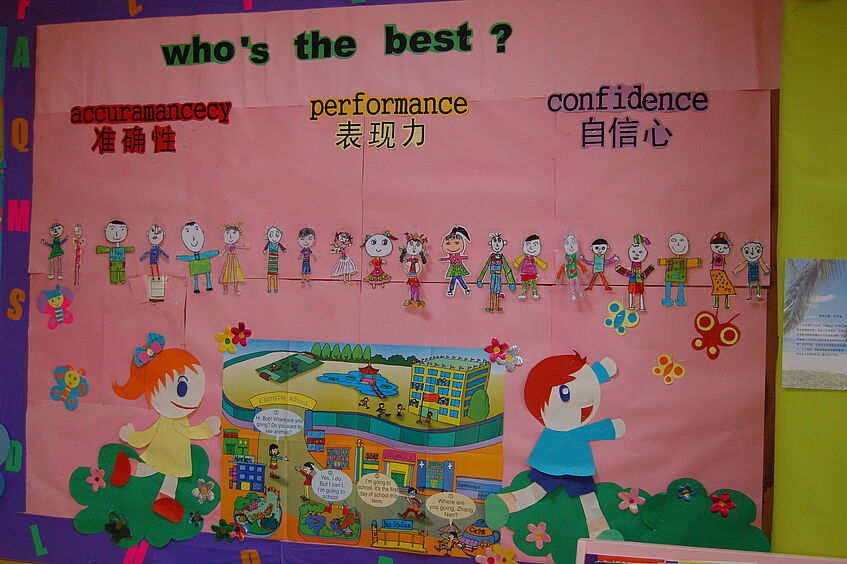Bildung als nationales und globales Steuerungsinstrument

Kontakt: Cristina Alarcón López und Barbara Schulte
In der Gegenwart wie in der Vergangenheit wird Bildung als Steuerungsinstrument auf lokaler, nationaler und globaler Ebene eingesetzt. Unsere Forschung interessiert sich dafür, wie Schulleistungsstudien und Rankings sowie global operierende Test- und Prüfungs-Regime zu Steuerungszwecken instrumentalisiert werden; aber auch für das Zusammenspiel von (globaler/lokaler) Bildungspolitik und Bildungspraxis.
Dies umfasst beispielsweise
(i) Berufsbildung als pädagogisch-politisches Instrument der Steuerung und Disziplinierung vor
dem Hintergrund einer massiven Bildungsexpansion und der wahrgenommenen Bedrohung einer gesellschaftlichen Destabilisierung;
(ii) nicht-staatliche Bildungsorganisationen und -akteure als Teile eines staatlich organisierten, korporativen Steuerungsmodells;
(iii) Prozesse der De- und Re-Regulierung sowie Privatisierung von Bildung;
(iv) Implementierung von Bildungspolitik als lokale Re-Inszenierung makropolitischer Narrative;
(v) das Programme for International Student Assessment (PISA) als ein globales Instrument von bildungspolitischer Steuerung sowie seine Verschränkung mit nationalen politischen Agenden.
Aktuelle Projekte:
Postdoc-Projekt (Alarcón Lopez) zur Globalisierung des Scholastic Aptitude Test (SAT).
Publikationen (Auswahl):
Alarcón, C. (2015). Governing by testing: circulation, psychometric knowledge, experts and the “Alliance for Progress” in Latin America during the 1960s and 1970s. European Education, 47(3), 199–214.
Larsen, J. E., Thue, F. W., & Schulte, B. (Eds.). (2022). Schoolteachers and the Nordic model: Comparative and historical perspectives. Routledge.
Schulte, B. (2012a). Joining Forces to Save the Nation: Corporate educational governance in Republican China. In J. Y. J. Hsu & R. Hasmath (Eds.), The Chinese corporatist state: Adaption, survival and resistance (pp. 10–28). Routledge.
Schulte, B. (2012b). World culture with Chinese characteristics: When global models go native. Comparative Education, 48(4), 473–486.
Schulte, B. (2013a). Europe refracted: Western education in China. European Education, 44(4), 67–87.
Schulte, B. (2013b). Unwelcome stranger to the system: Vocational education in early twentieth-century China. Comparative Education, 49(2), 226–241.
Schulte, B. (2017a). China. In Silke Trumpa, Doris Wittek, & Anne Sliwka (Eds.), Die Bildungssysteme der erfolgreichsten PISA-Länder: China, Finnland, Japan, Kanada und Korea [The educational systems of the most successful PISA countries: China, Finland, Japan, Canada and South Korea] (pp. 21–49). Waxmann.
Schulte, B. (2017b). Hochschulen Chinas. Zwischen Traditionen und Reformen im Kontext der globalen Wissensökonomie [Universities in China. Between Tradition and Reform in the Context of the Global Knowledge Economy]. In Joachim Freimuth & Monika Schädler (Eds.), Innovationskompetenz in der chinesischen Industrie und die globale Wissensökonomie [Innovation Skills in Chinese Industry and the Global Knowledge Economy] (p. forthcoming). Springer-Gabler.
Schulte, B. (2017c). Private schools in the People’s Republic of China: Development, modalities and contradictions. In T. Koinzer, R. Nikolai, & F. Waldow (Eds.), Private schools and school choice in compulsory education. Global change and national challenge (pp. 115–131). Springer.
Schulte, B. (2017d). Strategiskt lånande: John Dewey och den kinesiska utbildningen från 1919 och till i dag [Strategic borrowing: John Dewey and Chinese education, from 1919 until today]. In J. Landahl & C. Lundahl (Eds.), Bortom PISA. Internationell och jämförande pedagogik [Beyond PISA. An introduction to international and comparative education] (pp. 243–283). Natur & Kultur.
Schulte, B. (2018a). Allies and competitors: Private schools and the state in China. In G. Steiner-Khamsi & A. Draxler (Eds.), The state, business and education: Public-private partnerships revisited (pp. 68–84). Edward Elgar Publishing.
Schulte, B. (2018b). Envisioned and enacted practices: Educational policies and the ‘politics of use’ in schools. Journal of Curriculum Studies, 50(5), 624–637. doi.org/10.1080/00220272.2018.1502812
Schulte, B. (2019). Curse or blessing? Chinese academic responses to China’s PISA performance. In Gita Steiner-Khamsi & Florian Waldow (Eds.), Understanding PISA’s attractiveness: Critical analyses in comparative policy studies (pp. 177–197). Bloomsbury.
Schulte, B., & Wermke, W. (2019). Internationellt jämförande pedagogik: En introduktion [Comparative and International Education: An introduction]. Liber.
